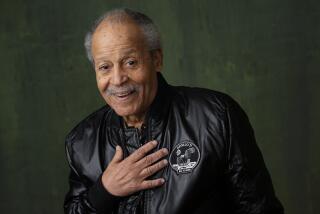Russia Welcomes U.S. âSpace Touristâ as a Hero
MOSCOW â Dennis Tito returned to a heroâs welcome--just not from his own country.
A lone American flag hastily put up at Chkalovsky military airport represented the United States on Sunday at the welcoming ceremony for the worldâs first âspace tourist.â
No representative of NASA or the U.S. government was on hand for the brief formal procedure near here that officially concluded the first individually paid sightseeing trip to outer space.
But if Tito, the Los Angeles multimillionaire who pressed ahead with his trip to the International Space Station despite NASAâs objections, felt snubbed, he was not showing it.
âFan-tas-tic!â he shouted before being ushered into the cosmonautsâ rehabilitation center by a burly guard. He was to undergo an examination Sunday evening at Star City, the cosmonaut training facility 20 miles northeast of the capital that was built to glorify the Russian space program.
Tito, who not only spent $20 million of his own money but also underwent 900 hours of cosmonaut training, never allowed himself to be discouraged by the political battles swirling around him. It had been worth every minute, he said.
âIt was paradise. I just came back from paradise,â he told a swarm of journalists earlier Sunday after he was pulled from the Soyuz TM-31 landing capsule on the plains of Kazakhstan, the former Soviet republic southeast of here, at 9:41 a.m. Moscow time.
Russian spacecraft fall on solid ground using parachutes and a last-moment burn of the capsuleâs rockets to cushion the impact. Tito became the first American to try the system. âSoft landing,â he said.
Immediately upon landing, Tito was pale and perspiring and was too disoriented to successfully juggle apples given him by his Kazakh greeters in a traditional goodwill gesture. But he was smiling broadly, and the elation stayed with him all the way to Moscow.
He was first flown with his two crew mates to the Kazakh capital, Astana, for a welcoming ceremony during which he was embraced by Kazakh President Nursultan A. Nazarbayev. The three men then flew on to Star City, where Tito had undergone the months of preparation for his flight.
About 150 military and space officials and a scattering of celebrities--including the popular Russian pop group Na-Na--were on hand to welcome them at the military airport. A brass band played two stirring marches, and flight commander Talgat Musabayev gave a brief, formal report of a successful mission and accepted congratulations from his superiors. The U.S. flag, hanging next to Russiaâs, was struck as soon as Tito departed the scene.
Tito remained in Star City on Sunday night, making phone calls to family and friends and arranging to return to the U.S. on Saturday, his personal spokeswoman, Kim Shepherd, said from Chicago.
She said Tito had told her that he enjoyed space âeven more than heâd imagined.â
âHe can hardly wait to share his experience with other people. He is very anxious to tell people about it and help others to achieve their dreams,â she said.
He also reported no ill health effects, she said. âHe said that heâd heard that space flight makes you feel younger, and he did.â
NASA, the main financier of the 16-nation International Space Station, acceded to Titoâs flight reluctantly after it became plain that Russia was not going to back down from its plan to fly him to the Russian-built section of the ISS.
The ISS began functioning late last year and is still under construction. U.S. space officials said having a nonprofessional on the station at this stage would be distracting and potentially dangerous, and they urged Russia to push back Titoâs ride until at least October.
Before finally agreeing that he could go, NASA insisted that Tito state in writing that he would pay for any damages he caused on board and said he could not enter the U.S. section of the station unescorted. Last week, NASA head Daniel S. Goldin also threatened to bill the Russian space program for the extra âbaby-sittingâ it caused by bringing Tito aboard.
With Tito safely back and the space station apparently none the worse for his visit, the Russians put a definite we-told-you-so spin on the dispute.
The episode seemed to reinflate Russiaâs space bravado, which was shrunk somewhat by budgetary cutbacks throughout the 1990s that ended in the deliberate sinking of the 15-year-old Mir space station in the Pacific earlier this year.
Lt. Gen. Valery Grin, deputy commander in chief of the Strategic Rocket Forces and head of the Russian space flights commission, said NASAâs objections âadded a lot of gray hairsâ to his head but âproved totally groundlessâ in the end.
âYou can call him a tourist, but he was so well trained that he could replace both the engineer and commander of the flight if needed,â Grin added.
His Russian colleagues also did not stint on compliments for Tito.
âHe showed the world what a real dream is and what it takes to achieve it,â said cosmonaut Viktor Afanasyev, the backup commander of Titoâs flight, who said he could see in the hours before the flight the strain Tito was under.
Afanasyev said he would never forget the look on Titoâs face when he was finally circling the globe: âThe entire world could see it was the smile of the happiest man on Earth, or rather, in space.â
*
Sergei L. Loiko of The Timesâ Moscow Bureau contributed to this report from Star City.
MORE INSIDE
Otherworldly: Titoâs Pacific Palisades mansion is home to annual fund-raiser, E1
More to Read
Sign up for Essential California
The most important California stories and recommendations in your inbox every morning.
You may occasionally receive promotional content from the Los Angeles Times.










